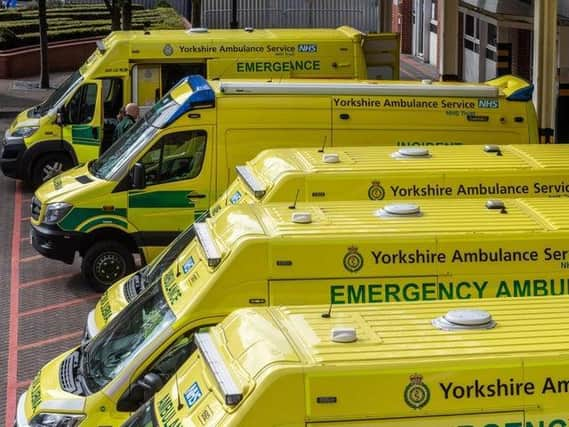31 new Covid deaths recorded at Yorkshire hospitals as death toll passes 7,000


It brings the total number of coronavirus patients to have died at hospital in Yorkshire to 7,031.
Deaths were recorded where a patient either tested positive for Covid-19 or where no positive test result was received for Covid-19, but Covid-19 was mentioned on their death certificate.
Advertisement
Hide AdAdvertisement
Hide AdNHS England releases updated figures each day showing the dates of every coronavirus-related death at hospitals in England, often including previously uncounted deaths that took place several days or even weeks ago.
Deaths were recorded at the following hospital trusts:
Barnsley Hospital NHS Foundation Trust - 5
Bradford Teaching Hospitals NHS Foundation Trust - 1
Calderdale and Huddersfield NHS Foundation Trust - 2
Doncaster and Bassetlaw Hospitals NHS Foundation Trust - 3
Hull University Teaching Hospitals NHS Foundation Trust - 4
Northern Lincolnshire and Goole NHS Foundation Trust - 2
Sheffield Teaching Hospitals NHS Foundation Trust - 7
South Tees Hospitals NHS Foundation Trust - 3
York Teaching Hospital NHS Foundation Trust - 2
City Health Care Partnership CIC - East Rising Community Hospital - 1
Across all English hospitals, a further 623 people who tested positive for coronavirus have died.
The announcement comes after a top medical advisor has said that because Coronavirus is now mutating “so rapidly” across the world that annual vaccinations may be needed to keep up with new variants of the virus.
Advertisement
Hide AdAdvertisement
Hide AdHealth Secretary Matt Hancock revealed there were 77 known cases of the South African variant in the UK and nine of the Brazilian variant.
Professor Anthony Harnden, deputy chair of the Joint Committee on Vaccination and Immunisation (JCVI), said that although foreign strains were “a real worry” the public should be reassured by the strength of vaccine technology.
Speaking on Sky News’ Sophy Ridge On Sunday he said: “I think we have to get used to this.
“We are living in a world where coronavirus is so prevalent and rapidly mutating there are going to be new variants that pop up in all sorts of different countries.
Advertisement
Hide AdAdvertisement
Hide Ad“We may well be in a situation where we have to have an annual coronavirus vaccine much like we do with the flu vaccine, but the public should be reassured that these technologies are relatively easy to edit and tweak, so once we find strains that are predominant, the vaccines can be altered.”
Earlier, Mr Hancock told the programme that work was being done with international counterparts to analyse the efficacy of the vaccine on foreign variants, but added he was more worried about further mutant strains that “had not been spotted”.
“There’s probably (variants) elsewhere that simply haven’t been picked up because the country doesn’t have that genomic sequencing service,” he said.
Mr Hancock said that tests were ongoing at Porton Down and in South Africa, adding that he wanted to see the UK’s genomic sequencing capability “made available across the world” so that emerging variants could be caught.
Advertisement
Hide AdAdvertisement
Hide Ad“In the meantime we’ve got to have a precautionary principle… so we’ve introduced pre-departure testing and we’ve also introduced checks on everybody to check that that has happened,” he said.
“It is absolutely vital that we protect this country from a variant that is not as well dealt with by the vaccine.
“We cannot risk the progress we have made.”
The Government’s chief scientific adviser Sir Patrick Vallance previously said there was “no evidence that the South African or Brazilian variants” were more transmissible than the new UK strain.
But he said: “It is the case that both the South African and Brazilian identified variants have more differences in shape which might mean they are recognised differently by antibodies.”
Advertisement
Hide AdAdvertisement
Hide Ad“I think it is too early to know the effect that will have on the vaccination in people and it is worth remembering that the response of the vaccine is very, very high antibody levels, so they may overcome some of this.”
Comment Guidelines
National World encourages reader discussion on our stories. User feedback, insights and back-and-forth exchanges add a rich layer of context to reporting. Please review our Community Guidelines before commenting.